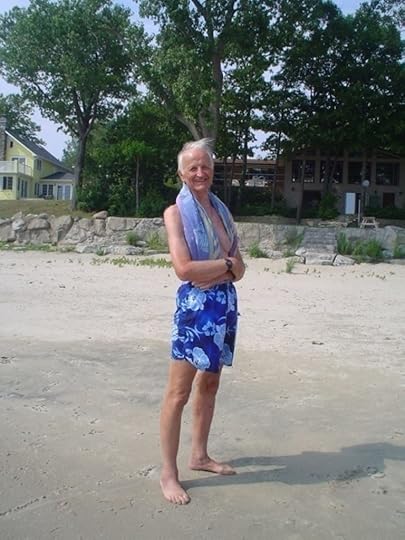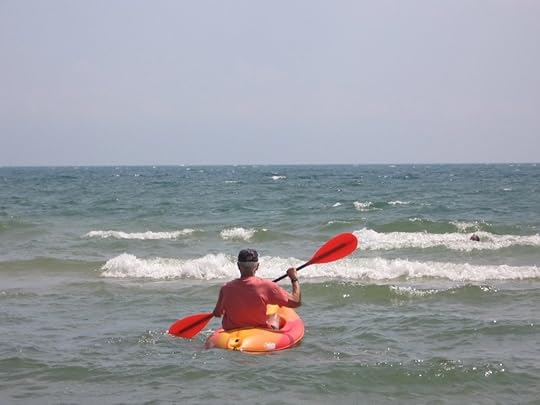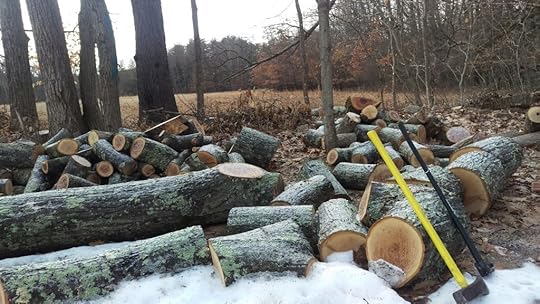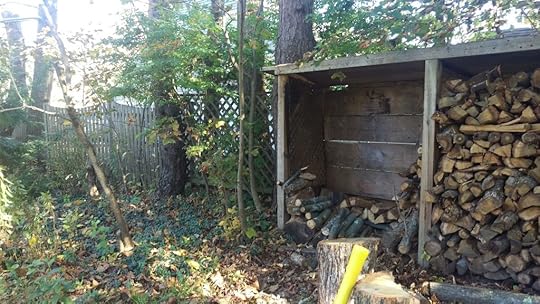David Klein's Blog, page 68
March 5, 2020
A Swim with My Dad
We’re in Canada at Thunder Bay Beach on Lake Erie, my father and me, standing at the shoreline. It’s a perfect late afternoon near the end of summer, the warm water lapping at our toes and the soft sand and hard pebbles contouring the bottoms of our feet. The sun glints like a thousand mirrors on the water’s surface. The long arc of the shoreline extends in either direction.
There’s the lighthouse in the distance, at Point Abino, a familiar blue pillar since my childhood.
It’s not even a pretty beach, just a small fenced public access squeezed between privately-owned waterfront homes extending in either direction. But it’s a pretty day and it’s my beach, the one where I spent every summer growing up. My father, now in his eighties, still has his summer home, just a block away. He still swims in this lake, almost every day.
Today will be his last swim.
There are other people on the beach — young families and a group of teens. My brother and his wife are sitting on beach chairs with their books. And I’m here, visiting for the weekend — I come at least once a month now.

Bob Klein has always been a good man, a humble man, soft-spoken and unassuming. Handsome. He’s a man of faith and of dignity. He believes in putting his fate in God’s hands, although I wonder if that belief is eroding.
Bob is a strong swimmer. In college, he captained his swim team at St. Bonaventure University. He can stroke and stroke — or could before he began to lose some of his coordination. That’s why somebody accompanies him when he swims now.
We walk into the shallows, where the water is the warmest, commenting on the beautiful day. We get along well, my father and I, although we haven’t always been close. He wasn’t the kind of father who had deep and meaningful conversations with his children (there are five of us). Maybe it was just the era when I grew up, in the 1960s and 1970s, or maybe it’s simply the nature of his character — and mine, too.
Once we get about waist deep, we exchange a glance and both take the plunge, diving below the surface, pushing through the water, cooler near the bottom, holding our breaths, then springing up.
“Oh, that’s nice,” he says, surfacing, the water dripping from his face.
I think I disappointed him a lot when I was younger. I got in some trouble. I lacked direction. I moved away to college when I was seventeen and hardly looked back. But I love my father, and I know he loves me.
We swim out to shoulder depth (we’re both tall, over six feet). We can see across to the other side, the United States. It’s probably ten or fifteen miles as the crow flies, or as the man swims. We used to talk about swimming across (ha, ha). We used to talk about walking along the beach, beach after beach, over sand and rock outcroppings — Thunder Bay, Windmill Point, Crescent Beach, Bertie Bay — all the way to the Peace Bridge at the mouth of the Niagara River. We never took that journey.

Today is his last swim because tomorrow his wife, Audrey (my mom died 30-something years ago and Bob remarried at one point), is taking my father back to Buffalo and putting him in an assisted living facility for residents with dementia. She can’t take care of him any longer. His behavior is too erratic and difficult. He’s done some things I don’t want to mention because they are humiliating and degrading, and if he knew he’d done them he’d be horrified and ashamed.
I know he doesn’t want to live this way. No one does.
I look back toward the shore and see moms watching their kids play in the shallows or in the sand. Sunbathers on the beach. Two guys tossing a football. My brother reading his book under a beach umbrella to protect him from the sun.
“Do you want to swim out a little farther?” I ask.
I don’t think he hears me.
“Remember when we used to talk about swimming across?”
He laughs at this.
“Do you want to try? To swim all the way across?” It’s a question I came up here planning to ask him and my heart beats a little faster when I do.
It may be immoral, but I’ve had this thought: My father can avoid the slow, inexorable black decline into mental nothingness and catatonia. He can swim straight out, deeper and deeper, farther and farther from the shore, intending to cross the lake, swim until he’s too exhausted to continue, and I will swim by his side and be there when he finally sinks and we’re too far out for me to save him. I would have to swim back alone.
“Swim across the lake?” he says.
“What do you think?”
He stares at the horizon, the hills rising above the far opposite shore, and then he looks at me and I see something in his eyes, what I interpret as a melancholy, despairing recognition of his situation, and his inability to do anything about it.
“It’s too far,” he says quietly.
He knows. I’m sure he knows.
“You’re right,” I say. “We’d never make it.” Although, knowing my father’s grit and determination, he just might make it across. I’m the one who would tire, flounder, and drown.
We head back to shore and wrap ourselves in towels and dry off in the sun. The next day he ends up in a place in Buffalo called Park Creek. A year later he’s moved to a nursing home. I keep visiting every month, witnessing the fade. I’m not sure if he knows who I am. A year later he is dead, and I am the one drowning.
The post A Swim with My Dad appeared first on by David Klein.
March 1, 2020
March 1 is a Special Day for Me
No, it’s not my birthday. I’m a Christmas baby — my birthday is December 25. My brother Peter, three years older than me, was also born on Christmas. What are the chances?
 Six years old?
Six years old?Two birthdays on Christmas in my family. Plus, of course, there’s Christmas to celebrate, which was always a big deal growing up. Christmas Eve with my mother’s family, full of Italian seafood specialties; Christmas day with my father’s family, full of ham and potatoes (and jello molds). A tree to get and decorate, presents to buy . . . all of it.
There was no time to celebrate our birthdays on our actual birthday. So my clever mom decided my brother and I would get a birthday celebration on our feast days. The feast of St. Peter is June 29; St. David is on March 1.
When March 1 came around I got to choose my dinner and my mom baked me a birthday cake. I got my birthday presents that day. I loved having that day as mine.
Fast forward decades and that tradition is long gone, but March 1 still comes every year and it remains a special day for me. It’s my day. No one else really knows about my feast day, or they no longer remember.
So I do things I like on March 1. Today I spent time with my beloved family, I worked on a jigsaw puzzle, I played tennis. It was a fine day. I couldn’t ask for more.
There’s another birthday in my family on Christmas. My daughter Julia was born on Christmas morning — best birthday and Christmas gift I could have ever gotten. Her birthday gets celebrated on December 25, as does mine now, but really, it’s hers. What are the chances?
The post March 1 is a Special Day for Me appeared first on by David Klein.
February 28, 2020
My Brilliant Career
People sometimes ask me how I became a writer. Well, the path was anything but straightforward.
I didn’t start out wanting to be a writer, but I gradually veered in that direction, bumping a few guardrails along the way.
Here is a list of all my paying jobs (unless I’ve forgotten some). Does this constitute a career? One definition of career is “a person’s progress or general course of action through life or through a phase of life, as in some profession or undertaking.”
Up Through High School Graduation
Harvester. Picked corn on the farm across the street from our summer cottage in Canada. I was paid some awful rate for every dozen ears of corn picked. I learned about being underpaid for the amount of corn I fairly picked. I also learned I was capable of overreporting my haul. Not sure which of those I learned about first. I also discovered that some ears of corn are crawling with maggots.
Janitor. In my elementary school. I was paid by the principal to clean blackboards, wipe desks, and mop floors for a few days before school opened in September. I accidentally spilled some mop bucket water on a hallway floor and thought that looked close enough to being mopped. Got caught by the nun. Yelled at.
Paperboy. That’s what they were called then: paperboys. I had a big blue wagon emblazoned with The Buffalo Evening News logo on its sides. My route was a big one — over one hundred papers. I went door to door collecting the $.95 weekly bill. Most, but not all, customers gave me a dollar and let me keep the nickel change.
*Sometime in this era of elementary school, I wrote a play about kids who kidnap Santa Claus and my class produced it. I also wrote a “book” about Nazi Germany, which won first prize in the history category (it was the only entry in that category). I also wrote a story about a hot dog that comes to life and runs away to avoid being eaten. It was a real page-turner.
Picker. Brand Names was a catalog store in Buffalo where customers came in and browsed through a showroom and ordered from a catalog. I worked the back for one holiday season, picking the orders off the shelves: alarm clocks, toys, gadgets, all kinds of stuff. A forgettable experience overall.
Store clerk. Mesmer’s Dairy was another Buffalo fixture. This retail outlet was an early convenience store. I worked there during my senior year of high school. I scooped one hell of an ice cream cone. The manager read pornographic magazines in the back room while I ran the register.
Factory worker. I spent two summers working at Westwood Pharmaceuticals, later acquired by Bristol Myers Squibb, mostly in a warehouse loading trucks, stacking boxes on pallets, and performing other mindless tasks. Full-time, 7:30 am – 4:00 pm. Reinforced my desire to go to college. My father worked in the executive suite, which is how I got a job at the company (as did my brother and sister).
College Years
Lumber baron. Maybe not a baron, but a laborer at the family-owned Zoladz Lumber Company. Two summers during college, plus one winter break. Unloading boxcars of lumber, picking orders, driving a delivery truck — six days a week. Hard work, but I was flush with money.
Dishwasher. I was perhaps one of the best dishwashers ever in the dining hall at the University at Albany. Worked a lot of the early breakfast shifts and learned to make a perfect egg over easy. I’ve put my dishwashing skills to work recently helping out my friends Paul and Caroline who run a cooking school.
Busboy. Oh, the old Stuffed Mushroom in Buffalo. Graduated at one point to barback, then bartender.
Landscaper. Another summer job working for a landscaping company. I cut a lot of lawns. Hated it.
Carpenter’s helper. I wasn’t much help. Didn’t know how to use tools yet, worked for a guy who had no patience or willingness to teach me. Lasted a couple of weeks.
Bank teller. Full-time job during a semester I took off from college because I was a bit lost. This at least made me want to go back and finish college. Since then, I’ve always had to have my paper money facing the same way.
Bartender. The Lark Tavern in Albany, last call at 4:00 am. Made more money than at any other job to date. I started as a bouncer and lied and said I had bartending experience. Got busted right away, but the manager kept me on and trained me. I had another long stint as a bartender at the long-gone Cranberry Bog, after I got out of college.
After College and Grad School
Temp. One job was counting the number of garbage trucks that came to Buffalo’s transfer station. I sat in my car and recorded the appearance of the truck and its time of arrival. Not sure what the point was. Another job was weighing pudding cups as they came off the filling line at Rich Products. If the weight was beyond an acceptable standard deviation, I got to turn a dial to increase or decrease the flow of pudding. Now that’s shouldering responsibility.
Builder/Remodeler. I went into business with two friends, Jim and Teri, doing remodeling work as well as house flipping. Financially and in other ways, the venture did not work out, but I learned skills and how to use tools.
*At this point, I decided to go back to graduate school, because I’d taken up writing short stories with a feverish gusto and thought (ha!) I’d do that for a living (ha!).
Writing Instructor. As part of my MA in creative writing program, I received a stipend to teach English Composition. I parlayed this into additional adjunct teaching positions over the years at D’Youville College, Cabrillo College, and Schenectady College.
Reporter/Editor. First at the Bee Group Newspapers, where I started as a “cub” reporter at a weekly and then became its editor. Some years later, I became the editor of a weekly newspaper in Santa Cruz, CA.
Waiter/Bartender/Manager. A seven-year stint at a single restaurant, the Sea Cloud, in Santa Cruz, CA. Fine restaurant, good job. By this time, I’m a novelist working as a waiter.
Marketer. Following a second master’s degree (Technical Communication, RPI), I worked in marketing for a software company, MapInfo Corporation. While I lasted more than six years and learned a lot about marketing, I also learned I wasn’t a good fit for the corporate world. I didn’t like being managed, or managing others, and I was a failure in the realm of office politics.
Entrepreneur. I abandoned a regular paycheck and put out my own shingle as a marketing consultant and freelance writer: Klein Marketing. This ended up being a smart and successful decision, mostly. The shingle is still up, but somewhat weathered.
Novelist. At this point, I’ve written dozens of short stories, had several published in literary journals, and written four previous novels, none of which had found daylight. But finally, I signed a two-book contract with Random House, resulting in the publication of STASH and CLEAN BREAK.
More novels to come, is the plan.
The post My Brilliant Career appeared first on by David Klein.
February 26, 2020
Quest for Fire
About the only thing I remember from Tom Wolfe’s novel, “A Man in Full” (the much less successful followup to “Bonfire of the Vanities”), was a character who said that when he wanted to make a fire he started with a tree.
I liked that. In many ways, I’m like that. Sure, I have a nice fireplace where all I need to do is arrange newspaper, kindling, and firewood, flick the lighter, and presto — blazing fire, viewed from two sides even, both the kitchen and living room.
At home, I make the fire and tend the fire. I’m largely responsible for it.
I’ve been running low on firewood so today I went to my friend Jim’s who had some logs under a tarp and we split them together and I loaded the back of my vehicle. These were from a tree we’d cut down last year and sectioned up.

There’s also a group of us in my town that keeps an eye out for fallen trees after storms. Or if any of us have a tree go down on our property. Or we spot someone piling logs for giveaway. We get the chainsaws out and cut what we can. If we’ve struck the motherlode we’ll rent a splitter and use the one truck among all of us to deliver wood to each of our driveways.
Splitting wood with a maul is hard labor, requiring full-body engagement. My maul has a heavy steel head and a composite handle. You have to give a big barnyard swing and it will shatter through most sixteen-inch lengths. The concussion of the impact rattles me.

Really big pieces require a maul and wedge. Then you’re pounding the head of the wedge, steel on steel, loud and striking like a nineteenth-century laborer driving railroad spikes.
After the wood is split, I store and season my it in a backyard crib I built from lumber that used to be the frame for our backyard ice rinks. The wood that’s most ready to use I store in the garage so I don’t have to trek outside in the winter every time I want to make a fire.
The entire quest is like a fire-making assembly line: Fell or find a tree, cut into sections, transport, split, store in crib, transfer to garage, move to basket next to fireplace, burn.
Obviously I love a fire. But lately, I’ve been conflicted about burning wood and its environmental impact. Cognitive dissonance, that’s all I can say right now.

And “Quest for Fire” — have you ever seen that movie with Rae Dawn Chong? You must. It’s a classic, in a weird kind of way. Not one word of dialog. I remember seeing the movie at the drive-in theater, on a chilly night, wishing I could make a warming fire in the bed of the pickup truck.
The post Quest for Fire appeared first on by David Klein.
February 21, 2020
THE CULLING: A Snippet From the Novel
The first time I read Shirley Jackson’s famous short story “The Lottery” I had known nothing of its reputation. As I read, the dread built in me slowly, the reveal astounded me, and the memory was blazed in me. I will never forget the power and audacity of that story. Here’s the original story, published in 1948 in the New Yorker.
“The Lottery” helped inspire my novel, THE CULLING. I was looking through the manuscript today, wondering what, if anything, to do with it. For today, I decided to post a tiny scene. In this scene, Maren Hart, the novel’s protagonist, is notified that she must report for the Lottery, a barbaric national practice of culling a percentage of the population on a regular basis. Maren believed she qualified for immunity — but there’s no fighting the system.
Did I mention the novel was dystopian? It was also inspired by “Blade Runner” and “Current Conditions and Leadership in our Country.”
Read the first chapter here. Below is a short excerpt:
—-
To:
Maren Beatrice Hart, Citizen #F2125-G79867 of the Republic of America
Re:
Lottery Notification
In
accordance with the constitutional requirements set forth in the Lottery
Amendment, you have hereby been selected and bestowed the honor to serve your
country as a Proffer in this month’s supplemental Lottery. You are required to
report to your nearest center within 24 hours.
*This
is an automated message. Do not respond.*
Inevitably there were additional callups each month beyond the weekly Lottery drawings, when adjustments in the numbers were needed to meet established quotas. To ensure fairness, the same birthdates were used that had already been drawn for that month. About ten percent of all Proffers were those selected in the monthly supplementals.
In Maren’s case there had been a glitch in
the system—a frightening one that got her heart racing, yet correctable.
She immediately entered her immunity code.
A message returned: Invalid Code.
Maren steadied herself and entered her
code again.
Invalid
Code.
Again.
Same thing.
Again. This time she did enter an invalid
code because her fingers were trembling and she made a mistake keying the
screen.
A message returned she’d been locked out
of the system after four invalid attempts. It was standard procedure due to
hackers writing and selling bots that input all combinations of immunity codes in
an attempt to beat the system.
Maren knew: This wasn’t one of those
notorious system bugs you heard stories about, due to hackers or flawed code.
This was a deliberate attempt to cull her. And she knew why.
She had of course many times imagined how she’d respond to a culling notice, and her imagination turned out to align well with reality: She experienced a brief period of pure and complete terror, soon replaced by a determination to survive and escape, followed by the realization that escape would be impossible for her, and finally the conclusion she must kill herself.
As soon as her thoughts plotted this
scenario to its end, she pivoted from the idea of suicide. She didn’t have the
courage. Some people could take their own lives—many did—but her internal wiring
would not make the necessary connection to turn thought into action. If she
lived to be old, she could see herself clinging to any semblance of life,
despite the diseases and agonies of the aged. Too much a coward, she was, to
take the ultimate last step.
Yet for someone with such a burning
resolve to continue living, she no idea how to do so. She had endless stores of
energy, loads of conviction, excess motivation—and nowhere to direct her
resources. She had to think. She had to be smart. At the moment she was neither
of these. A strange numbness invaded her, as if she’d taken a powerful sedative.
Her legs weakened. The energy and conviction of just seconds ago had vanished.
She made her way to a chair and sat down. She couldn’t clear her head. Her mind
felt thick and cobwebby. She leaned back and breathed shallowly. Within minutes
she descended into a paralyzed, catatonic shock, no longer aware of time
passing or the danger she was in.
The post THE CULLING: A Snippet From the Novel appeared first on by David Klein.
February 20, 2020
THE BOOK OF UNKNOWN AMERICANS vs. AMERICAN DIRT

I read AMERICAN DIRT and while I appreciated the author’s efforts and her skill at writing a thriller, I was also conflicted by the lack of authenticity I felt about the novel — even before the controversy exploded. I wrote a review (3 of 5 stars) and then another post about appropriation.
I got caught up in the protests over Jeanine Cummins’ novel, mostly by Latino writers, who were outraged that a white writer had been given such a huge publishing contract and marketing rollout for a book about migrants.
One of those angry voices, belonging to the Mexican American writer David Bowles, listed some books people should be reading instead of American Dirt if they wanted a more authentic take on the migrant experience.
And so I arrived at THE BOOK OF UNKNOWN AMERICANS, by Cristina Henriquez.
This novel focuses on migrants who have already arrived in the United States, some having been here for many years, others recent arrivals. The primary narrative is a teenage love story, which gives the novel a bit of a YA feel, but there are also short vignettes narrated by secondary characters that really bring the novel and the migrant experience to life. I think.
Henriquez is a talented young writer. The novel is an easy and rewarding read.
But is it more authentic than American Dirt? I can’t answer my own question because I don’t have first-hand knowledge of the migrant experience, but I did feel at many points in the novel, especially in those scenes that were frustrating, frightening, unfair, or hopeless for the characters, that “this is how it must be for migrants.” And it often wasn’t pretty.
Jeanine Cummins also wrote about frustrating, frightening, unfair, and hopeless situations for her characters, but the characters, structure, and narrative arc of American Dirt are somehow sanitized, or Americanized: the familiar and appealing protagonists (grieving but determined mother, resilient young son), the tense thriller chase (standard fare), the peek at violence (but pulling back to avoid graphic or unsettling detail). Not one character acted in any way that was surprising or unfamiliar to me.
Not so in The Book of Unknown Americans. I hadn’t expected the men to be so patriarchal and authoritarian, or the women to be so submissive. I hadn’t realized how difficult the language barrier makes just about everything. How hard the characters were willing to work to make a better life, how much they were willing to endure.
The teenagers, though, were teenagers through and through, although the young woman, Maribel, was a unique choice for a character, as a brain injury motivated her parents to move north to the United States to get their daughter better care.
In the end, it’s not that one novel is right and the other wrong, or one is good and the other not. But what does seem wrong is that a publisher anointed one of these novels as “It” and sunk a boatload of resources into ensuring it will be a bestseller.
As a very midlist author myself, I’d like to see publishing resources spread out a bit more, but that’s a different story.
4 out of 5 stars for The Book of Unknown Americans.
The post THE BOOK OF UNKNOWN AMERICANS vs. AMERICAN DIRT appeared first on by David Klein.
February 18, 2020
Dog Person, Cat Person, People Person
Are you a dog person or a cat person? Apparently, you need to choose a side.
I can tell you right now I am not a dog person. That doesn’t mean I don’t like dogs. I do. Dogs are fine. They can be playful and fun. But I don’t like it when dogs jump up and put their paws on me. Or when they have to stick their noses in my crotch or slobber on me. I don’ t like dogs licking me. I definitely don’t like encountering an unleashed dog when I’m out for a run.
And dog owners? They tend to be fine, too. Studies have shown that the dog person is more extroverted than, say, the cat person. Some people claim that dog owners are more conservative than cat owners. Nine of the top 10 dog-owning states voted solidly Republican in the 2012 election, while 9 of the bottom 10 dog-owning states voted for President Obama.
I’ve never owned a dog, but I have enjoyed the company of dogs, at times. I’m a solid cat person. I own two now — or they own me. There’s a saying that people own their dogs, but cats own their people.
My current cats are loving, but I’ve had others who were more remote. I didn’t mind. Cats give what they can give. I think of cats as less needy and desperate for attention than dogs. I think they’re more dignified. They’re definitely less work, if that matters to you. I can leave my cats all day, or a few days. I don’t have to walk them. But that doesn’t mean I don’t love them.
Which brings me to the topic of the people person. Whereas being a dog person or cat person may simply be a personal preference, with neither judged as inherently better than the other, being a people person is unquestionably a coveted trait.
No one goes to a job interview and says they’re not a people person. If you’re not a people person that must mean you’re a moody, isolated misanthrope. Of course, that’s far from the truth.
It’s a sensitive topic for me because I’ve been told I’m not a people person. I’m introverted, I don’t mix with others easily or naturally, parties exhaust me, I take a long time to make friends. But I do like people. Some of them I even love and would give my life for.
I do like being with others: conversing, trading stories, teaching and learning — I need this social interaction as much as anyone else. Until I don’t. Because being with people takes so much energy, it can also exhaust me. When I’m done I’m done. When I want to be alone I want to be alone.
That’s a key difference between extroverts and introverts: extroverts are energized by being around others; introverts like being around others, but it requires giving energy rather than being energized, and introverts must at some point retreat to recharge.
So it’s not that I’m not a people person. I am. People are fine. I just don’ t like when they jump on me or push their noses in my crotch or drool on me.
The post Dog Person, Cat Person, People Person appeared first on by David Klein.
February 14, 2020
A Patron of the Arts Is Gone
When I think of the Koch Brothers, I think of Charles and David and the behemoth Koch Industries. My impression of the Koch Brothers: ruthless capitalists and libertarians. Conservative and greedy polluters.
I didn’t know of the eldest Koch brother, Frederick, whose obit I just read in the New York Times: “Frederick Koch, Who Spurned Family Business, Dies at 86.”
It was this from the obit that got me the most:
Frederick’s spurning of the family business helped fuel the disappointment that Fred Chase Koch, a self-made man and rugged individualist, felt toward his oldest son.
NYT
Why was Frederick a disappointment to a self-made man and rugged individualist? Maybe this quote, from Frederick’s brother William, sheds some light:
“When Freddie was born, he was delicate, he liked the arts, he was a singer and loved poetry. He didn’t want to play baseball.”
At one point, Dad kicked his oldest son out of the family. As an adult, Frederick had little to do with his brothers, other than through lawsuits they filed against each other.
Frederick used his portion of the family wealth to fund the arts. He collected rare manuscripts, restored historical manors and such. That’s not definitely fulfilling Dad’s dream of oil-drilling.
Frederick had the financial circumstances to live the life he wanted, and he did exactly that. His entire estate is being left to a foundation that will promote the study of history, literature and the arts. Just the other day I was lamenting how we live in a country that doesn’t value the arts enough.
Frederick’s only survivors are his brothers Bill and Charles. The other brother, David, is already gone. The father who was disappointed in him: long gone. I hope there were others who loved him.
The post A Patron of the Arts Is Gone appeared first on by David Klein.
February 12, 2020
SOMETHING IN THE WATER, Catherine Steadman

There’s a lot to admire about Catherine Steadman’s psychological thriller, Something in the Water. First off, that’s a great title. Honeymooning couple Erin and Mark find a bag of money and diamonds floating in the water off the coast of Bora Bora. Guess what? They decide to keep it.
The “finding a bunch of money and deciding, against your better judgment, to keep it” is a basic premise, used by everyone from Scott Smith in A Simple Plan to Cormac McCarthy in No Country for Old Men.
The novel starts off with the best scene in the book–Erin digging a grave for her husband. It’s a riveting scene, and Erin as a narrator has a voice fraught with urgency, reflection, and astonishment.
The novel needs to start off with a bang, because then not a lot happens over the next hundred pages as we learn of Erin and Mark’s love, courtship, career issues, ambitions, etc. Until the money find.
And heroine Erin, whose voice seemed so compelling while digging the grave, turns out to endlessly chatter inside her head: overthinking, overanalyzing, repeating herself. She gets annoying and the book seems too long because of it.
On the other hand, you can get caught up with her and her perils as she tries to get away with keeping the money. A subplot about her career as a documentary filmmaker dovetails nicely with the main plot, as does husband Mark’s recent firing from his job in finance.
Like most novels in this genre, the protagonist possesses some pretty dubious decision-making skills, which leads to more and more trouble, and plot plausibility gets stretched, but the point of these stories is to suspend your sense of disbelief and hop on for the ride. If you like doing that, you should like this book.
Steadman’s second novel, Mr. Nobody, came out recently. Another great title. If you like one, you’ll probably like the other.
3 stars out of 5
The post SOMETHING IN THE WATER, Catherine Steadman appeared first on by David Klein.
February 11, 2020
Time for a Library Visit?
For me, the best part of my local library is the book collection. There’s also music and video content, and a Library of Things: games, museum passes, even fishing poles. There are popular programs for kids, teens, and adults.
There’s a full schedule of book discussions, school visits, mentoring, volunteering.

I do some writing at the library (but not this post). I’ve decided that living in a community with a good library is a must. I host my own Little Free Library on my front lawn. One of my closest friends is a librarian.
So, of course I was disheartened to hear that the Trump Administration proposed 2021 budget called for entirely eliminating the Institute of Museum and Library Services. The Institute is the main source of federal support for libraries and museums.
Elimination: that means entirely gone.
Also proposed for elimination: the National Endowment for the Arts and the National Endowment for Humanities.
This is the fourth straight year the neck of arts and humanities are on the proposed federal chopping block, which means it won’t happen, or not entirely. A proposed budget is a political statement. All the wheeling and dealing is still to come.
But what a statement this administration is making. I mean, why should our government fund arts and humanities? Who wants to live in a country in which arts and humanities are valued, supported and cherished? Or, for that matter, where environmental protection is a priority? Or people–how about people being a priority (health care, education, safety net)?
It’s very distressing to me. I handle it by writing. THE CULLING, a dystopian thriller, was my response last year.
This year, I don’t know. I think I’ll start by putting some dystopian classics in my Little Free Library. I’ve got Brave New World, 1984, Handmaid’s Tale, a few others I can share in my library. Tomorrow I’ll head over to the town library, just to be there.
The post Time for a Library Visit? appeared first on by David Klein.



